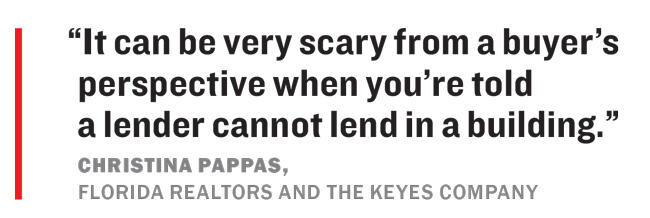Condo associations and property management firms are refusing to comply with new lending standards that aim to limit lending for units in structurally unsafe communities, resulting in canceled deals in South Florida and across the country.
The move, by Fannie Mae at the start of the year and Freddie Mac as of March 1, is in response to the deadly condo collapse in Surfside last summer, which killed 98 people and, in some cases, left their families on the hook for their mortgages. The federal agencies now require associations or property managers to answer questions about the health of the buildings that lenders would be backing.
For condo buyers — especially first-time buyers who have been priced out of single-family homes and face steep apartment rent increases — and existing owners seeking refinances, the tighter lending standards have already had an effect on the market.
Some condo associations have refused to fill out the updated questionnaires, which ask whether a regulating or inspection agency has directed a property to make repairs due to unsafe conditions.
“Some of our most affordable housing in Florida is condos,” said Christina Pappas, president of the Florida Realtors and vice president of the Keyes Company. “It already was tough for our condos to be purchased by first-time homebuyers, and this has made it extremely tough and disheartening for buyers.”
Anything you say can and will be used against you
There are workarounds, experts say, but many prospective buyers are reporting delays in getting financing. If a lender or mortgage servicer doesn’t accept a partially filled out questionnaire, that suggests it will be difficult to close loans at the same property in the future, experts add.
Even if a buyer is seeking a conventional loan that’s not Fannie- or Freddie-backed, most conventional lenders follow the same guidelines.
“For most of the 30-year, fixed-rate mortgages, either a bank or company is selling them to Fannie or Freddie or they want to be able to. They don’t want to create a loan they can’t sell,” said Craig Garcia, president of Capital Partners Mortgage, a lender in Florida.
Liability is also a major issue for associations and property management firms.
“Some management companies have taken the stance of ‘We’ve been advised by counsel [not to answer],’” Garcia said. “You can understand their reluctance.”
Defendants have started to settle litigation surrounding the Surfside tragedy with the victims’ families and survivors by paying out insurance policies. Becker, the law firm that represented Champlain Towers South’s condo association prior to the collapse, agreed to pay $31 million. And the engineering firm that inspected the beachfront building for its 40-year recertification is paying $16 million.
The condo association itself, which allegedly ignored years of warnings about problems with the building, is a target of the primary lawsuit, which is seeking class-action status.

“Everything” has changed as a result of the collapse, said Frank Simone, general counsel and partner at KW Property Management & Consulting. “The federal government that backs these mortgages doesn’t want to be on the hook for no collateral.”
In a survey performed by the Community Associations Institute, 35 percent of its members reported a delay in lender approval, and 27 percent said they’ve had loans denied because the questions are not being answered. That’s not specific to one price point, brokers, lawyers and property managers say.
“If associations don’t comply with it, and Fannie Mae and Freddie Mac refuse to issue loans, then that becomes a vicious cycle,” Simone said. “That could have a negative effect on property values.”
He pointed out that KW doesn’t have an official stance on how associations should respond.
A rise in all-cash deals
The June collapse of Champlain Towers South didn’t slow condo sales in South Florida, but it did accelerate the trend of condo buyouts of older properties in need of repairs.
Some investors and developers, seeking bulk deals, have targeted unit owners of older properties that have been put on notice by city or county building departments. The prospective buyers either want to fix units and lease them or acquire all the units in a building to then demolish the condo and build something new.
Overall, South Florida condo sales and median prices have continued to grow, surpassing single-family home sales. Affordability has weakened.
Nationwide, a quarter of residential sales are all cash, according to the National Association of Realtors. Yet, in South Florida, cash sales account for about half of all condo sales. Even in the new condo development market, investors are scooping up more affordable units that have rental flexibility.
Limiting the buyer pool to just investors who already dominate in the most expensive housing markets is problematic in the long run, attorneys say.
“When you restrict the opportunity to purchase a home, you open the door for essential housing stock to be scooped up by investors, the only buyers to pay all cash for the purchase,” Dawn Bauman, a senior vice president at Community Associations Institute, said in a press release about the impact of the new questionnaires.
Chris Cash, senior vice president of national operations at Hamilton Home Loans, said he is still able to complete the questionnaires verbally with associations or property management firms, which has resulted in fewer issues with the new Fannie and Freddie rules.
“Six months from now they may fix it,” he said, referring to Fannie and Freddie. If a lender rejects a loan application in a building, “it doesn’t mean a condo is now blacklisted.”
Potential loopholes
A new law in Miami-Dade County aims to increase transparency regarding condo and homeowners’ associations’ financial and structural health, which could benefit would-be buyers. Associations will be required to file structural reports, financial statements, insurance policies, budgets and major planned projects to the county by Feb. 1, 2023, and continue to do so on an annual basis.
As it stands, buyers are forced to rely on sellers to provide that information. By law, sellers have to turn over financial documents and assessment reports to buyers only when a sales contract has been signed and the buyer requests the information.
“That transparency of documents will help lenders, buyers know what they are getting into prior to an inspection or appraisal,” said Pappas of the Keyes Company. That will save buyers time and money, both of which are increasingly limited in today’s market, especially as interest rates tick up. “We believe this will mitigate that,” she said.
Simone, who is president of his own homeowners association, said associations “may or not understand what the question is and why it’s been asked.”
Unlike the issue of insufficient reserves, safety questions are generally still required to be answered, even when buyers are putting down big deposits of 25 percent, Pappas noted, which happened with a listing the Keyes Company had at a senior living community.
“It can be very scary from a buyers’ perspective when you’re told a lender cannot lend in a building,” Pappas said. “We are seeing anecdotally many associations let our buyers and sellers know they will not be filling those questionnaires out.”
Garcia, the mortgage lender, and others said that if the associations refuse to answer questions or fill out questionnaires, the lenders can sometimes obtain that information from the seller or someone on the association board, though it takes a bit more time and a lot more documentation.
“We have closed some transactions we didn’ t think we would approve,” Garcia said.
With one recent loan, the association was asked if there had been a recent engineer’s report, how much needed repairs would cost and how much the building had in reserves. The building had $2 million worth of work that needed to be completed, with only $200,000 in the bank. But the lender got the seller involved, and the seller was able to provide the engineer’s report. It showed that the repairs were cosmetic in nature and planned to be completed according to a set schedule.
“It was deemed to be acceptable,” Garcia said, but it would not have happened without extra due diligence. “I would anticipate over time, it should get a bit clearer which condos are OK and which are not.”
